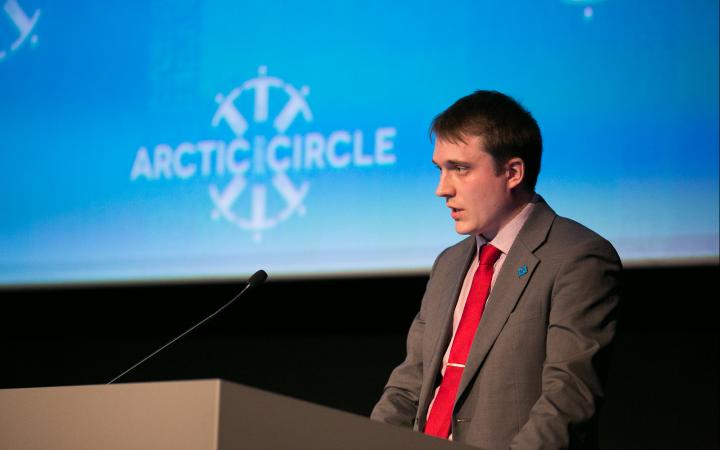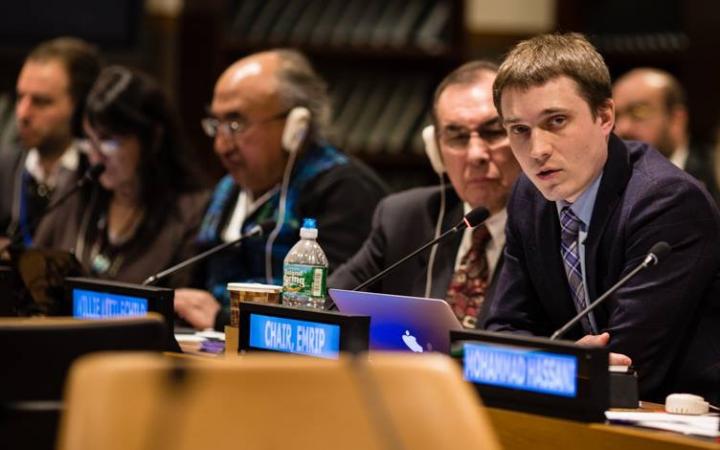Beneficiary: Aleksei Tsykarev
Title: Chair, Center for Support of Indigenous Peoples and Civic Diplomacy “Young Karelia” Former Expert Member and Chair of the United Nations Expert Mechanism on the Rights of Indigenous Peoples
Training: UNITAR Training Programme to Enhance the Conflict Prevention and Peacemaking Capacities of Indigenous Peoples Representatives
“I was so lucky to be selected for the UNITAR training programme at the very beginning of my UN career. Earlier I attended the OHCHR Indigenous Fellowship Programme, and had an image of how the mechanisms work and my own ideas on how to defend indigenous peoples’ rights. These were very helpful in my being appointed to EMRIP. At the same time, that part was theory — I also needed strategies and practice. This is exactly what I got at the UNITAR training.”
Aleksei Tsykarev was an incoming member of the UN Expert Mechanism on the Rights of Indigenous Peoples (EMRIP), a subsidiary body of the UN Human Rights Council, when he first joined the UNITAR Training Programme to Enhance the Conflict Prevention and Peacemaking Capacities of Indigenous Peoples Representatives. “People highly recommended I take this training to be able to apply the knowledge and strengthened skills in many important and innovative ways”.
The UNITAR training took place just one week after his first session as a UN mandate holder — the youngest person ever appointed to a UN indigenous-specific mechanism and with the least amount of international experience.
“There was no accommodation time, as the work of mandate holders is very responsible and challenging, and indigenous peoples around the world expect results and efficiency from experts.”
Mr. Tsykarev is a representative of the Karelian people, an indigenous Finno-Ugric people living mainly in northwest Russia. A prominent member of the Finno-Ugric peoples’ movement there, he is also known in international indigenous circles for his UN advocacy, including with the Global Indigenous Youth Caucus. Negotiations and conflict analysis are part of his routine in both local and global activism. “I am using the skills, knowledge and networking from the UNITAR training on a daily basis, as are the organizations I am representing.” Over 500 indigenous representatives from around the world have been trained in 11 international and 6 regional UNITAR Training Programmes to date strengthening knowledge and skills in dialogue, conflict analysis, negotiation and reconciliation.
Two years after the UNITAR Training, Mr. Tsykarev was entrusted by colleagues to lead EMRIP through the process of reviewing its mandate. It was a challenging job, which required continued engagement with states and indigenous peoples — negotiations with all stakeholders. “We encountered so many opposite positions, and in such circumstances, I had to act on behalf of the group of five experts and present our collective views in the most diplomatic and strong way to ensure the new mandate of EMRIP would be instrumental to improve the situations on the ground. I would have never agreed to chair EMRIP during such difficult times if I was not confident in my skills. I believe the knowledge I obtained at the UNITAR training was one of the key elements in building that confidence.”
Understanding root causes of conflicts, tensions and misunderstandings, which Mr. Tsykarev learned at the training programme, has been useful on many occasions in his international work including on negotiations on new World Bank social and environmental safeguards, at meetings with African governments in Ethiopia, or facilitating a dialogue between the Saami Parliament and a government during a country engagement mission.
Mr. Tsykarev has used his conflict prevention knowledge multiple times in many international capacities: while advocating for the proclamation of an International Year of Indigenous Languages (2019 IYIL) and serving on its Steering Committee, or representing his people — the Karelians — in the World Congress of Finno-Ugric Peoples. Holding the cultural and linguistic rights portfolio at EMRIP, Mr. Tsykarev has promoted indigenous languages from the human rights perspective. It is noteworthy that the Action Plan for 2019 IYIL prepared by UNESCO understands the positive role of indigenous languages in conflict prevention and peacemaking.
Currently, Mr. Tsykarev is not only applying his knowledge in his own work but also transmits it to the next generations of activists and indigenous rights defenders in his own country and internationally. He organizes capacity building trainings in the Republic of Karelia and across Finno-Ugric regions in Russia, for which he has asked UNITAR’s permission to use some of the exercises and materials. He also teaches and presents at the OHCHR Indigenous Fellowship Programme, Arctic Summer College, academic institutions and conferences around the world. Five years after being a trainee himself, he now serves as a resource person for the UNITAR trainings on conflict prevention and peacemaking. “I see the eyes of many young indigenous advocates. They are eager to act passionately and quickly, and this is a good energy they have, but sometimes we need to calm down, analyze and rethink our approaches, to make the results of our important work sustainable.”



